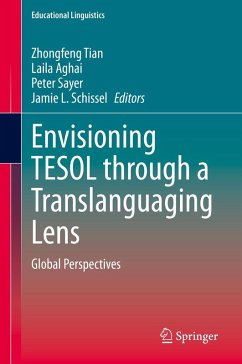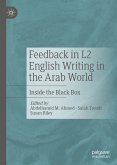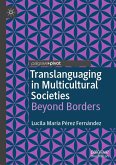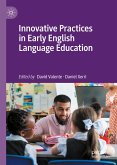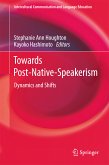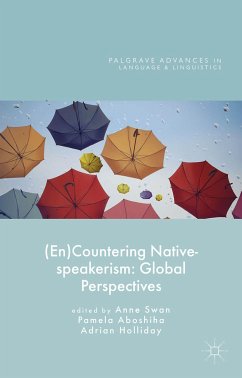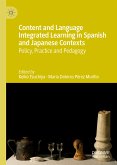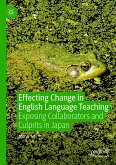This is a welcome addition to the growing literature on translanguaging as a new lens on a variety of topics in language education with a distinctive focus on TESOL. The global perspective is a real strength of the volume. It will, as the editors promise, transform TESOL education. Li Wei, Chair of Applied Linguistics, UCL Institute of Education, University College London, UK
Dieser Download kann aus rechtlichen Gründen nur mit Rechnungsadresse in A, B, BG, CY, CZ, D, DK, EW, E, FIN, F, GR, HR, H, IRL, I, LT, L, LR, M, NL, PL, P, R, S, SLO, SK ausgeliefert werden.
Hinweis: Dieser Artikel kann nur an eine deutsche Lieferadresse ausgeliefert werden.
"This edited volume truly explores the practice of translanguaging in the ESL/EFL classroom across the global context, with contributions from authors in a multitude of instructional contexts and countries. ... The book is dense with an immense amount of information and guidance ... ." (Liza E. Martinez and Kara Mac Donald, CATESOL, catesol.org, November 29, 2022)
"This volume strongly contributes to the theorization and implementation of translanguaging. ... this volume shows how the TESOL field could embrace multilingualism as central to its values, opens critical conversations on how to conceptualize and implement translanguaging in various TESOL teacher education and classrooms contexts, and generates authentic, sustainable, and contextualized knowledge for pedagogical improvements. ... It will be of interest to scholars and policymakers in TESOL education, emerging scholars, and educators engaged in promoting flexible multilingualism in the classroom." (Xinyue Lu, TESL Canada Journal, Vol. 38 (2), 2022)
"The major, noticeable, strength of this volume is the quality of its contributions, underpinned as they are by rigorous methodology and thoughtful critique. In addition, the wide range of educational, socioeconomic, and geopolitical contexts in which translanguagingpedagogy is exemplified in this volume serves to underpin its theoretical credibility and adds to a growing body of evidence to support multilingual education." (Emma Brooks, ELT journal, Vol. 76 (1), January, 2022)
"Among the strengths of the book is that it achieves its goal and offers valuable theoretical and practical insights to TESOL professionals, and creates the necessary tension for their ideological shift. The described and theorized multifaceted translanguaging lens can be used as a theoretical framework, and the various research designs in the chapters can guide translanguaging researchers in their inquiries. ... Overall, the book provides valuable information on the theory and practice of translanguaging in the terrains of TESOL." (Serikbolsyn Tastanbek, Translation and Translanguaging in Multilingual Contexts, January 14, 2022)
"The diversity in the scholars' perspectives on translanguaging is one of the great virtues of this volume. ...Each chapter's implications are inspiring, timely, and thirstquenching contributions to the development of translanguaging scholarship, which has been fervently calling for empirical research of and pedagogical approaches to translanguaging. Teacher educators, researchers, graduate students, professionals, and practitioners interested in learning about translanguaging and its promise and challenges in TESOL education would appreciate the insights this book can provide." (Woongsik Choi, Journal of Language, Identity & Education, September 8, 2021)
"This volume is the first of its kind to apply a translanguaging lens to TESOL. ... To be fair, this informative and insightful book connects translanguaging ideologies and pedagogies with TESOL, the arguments are sound and the findings are of high reference value. It is a timely addition and a valuable contribution to the growing literature on translanguaging, 'as a theoretical framework for informing TESOL, an orientation for teacher education, and a pedagogical tool in the classroom' ... ." ( Xin Li, International Journal of Multilingualism, July 1, 2021)
"The diversity of studies, contexts, participants, and methods allows for a fuller understanding for researchers and educators of how a translanguaging lens fits into TESOL research, educator programs, and the classroom. ... Although the contributors all faced complex challenges surrounding translanguaging, they all remain committed to its potential to critically address English hegemony, learner agency, and a more inclusive and theoretically sound TESOL." (Kimberly S. Hansen, tesol Quarterly, Vol. 55 (2), June, 2021)
"I would highly recommend it to teachers and teacher educators who are developing their understanding of translanguaging in the field of TESOL." (Skye Playsted, English Australia Journal, Vol. 37 (1), 2021)

